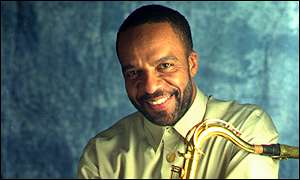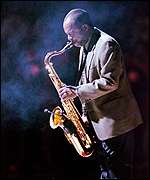| B i o g r a p h y |
 Grover Washington, Jr.
(December 12, 1943 – December 17, 1999) was an American jazz-funk /
soul-jazz saxophonist. Along with John Klemmer, George Benson, David
Sanborn, Bob James, Chuck Mangione, Herb Alpert, and Spyro Gyra, he is
considered by many to be one of the founding fathers of the smooth jazz
genre. Throughout the 1970s and 1980s, Washington made some of the
genre's most memorable hits, including "Mr. Magic", "Black Frost", and
"The Best is Yet to Come". In addition, he performed very frequently
with other artists, including Bill Withers on "Just the Two of Us"
(still in regular rotation on radio today) and Phyllis Hyman on "A
Sacred Kind of Love". He is also remembered for his take on a Dave
Brubeck classic, called "Take Another Five", and for his hit "Soulful
Strut". Washington played on black nickel-plated saxophones. His SX90R
alto and SX90R tenor saxophones were made by Keilworth. His soprano was
made by Couf.
Grover Washington, Jr.
(December 12, 1943 – December 17, 1999) was an American jazz-funk /
soul-jazz saxophonist. Along with John Klemmer, George Benson, David
Sanborn, Bob James, Chuck Mangione, Herb Alpert, and Spyro Gyra, he is
considered by many to be one of the founding fathers of the smooth jazz
genre. Throughout the 1970s and 1980s, Washington made some of the
genre's most memorable hits, including "Mr. Magic", "Black Frost", and
"The Best is Yet to Come". In addition, he performed very frequently
with other artists, including Bill Withers on "Just the Two of Us"
(still in regular rotation on radio today) and Phyllis Hyman on "A
Sacred Kind of Love". He is also remembered for his take on a Dave
Brubeck classic, called "Take Another Five", and for his hit "Soulful
Strut". Washington played on black nickel-plated saxophones. His SX90R
alto and SX90R tenor saxophones were made by Keilworth. His soprano was
made by Couf.
Washington was born in Buffalo, New York on December 12, 1943. His mother was a church chorister, and his father was a collector of old jazz 78s and a saxophonist as well, so music was everywhere in the home. He grew up with the great jazzmen and big band leaders like Benny Goodman, Fletcher Henderson, and others like them. At the age of 8, with the desire for him to be more than he could be, Grover Sr. gave Jr. a saxophone. He practiced and sneaked into clubs to see famous Buffalo blues musicians.
Washington left Buffalo and played with a midwest group called the Four Clefs. He was drafted into the U.S. Army shortly thereafter, but this was to be to his advantage, as he met drummer Billy Cobham. Cobham, a mainstay in New York City, introduced Washington to many New York musicians. After leaving the Army, Washington freelanced his talents around New York City, eventually landing in Philadelphia in 1967. Washington's big break came at the expense of another artist. Alto sax man Hank Crawford was unable to make a recording date with Creed Taylor's Kudu Records, and Washington took his place, even though he was a backup. This led to his first album, Inner City Blues. He was talented, and displayed heart and soul with soprano, alto, tenor, and baritone saxophones. Refreshing for his time, he made headway into the jazz mainstream.
 His
fifth album, 1974's Mister Magic, was a commercial success, and
introduced guitarist Eric Gale as a near-permanent member in
Washington's arsenal. A string of acclaimed records brought Washington
through the 1970s, which culminated in the signature piece for
everything Washington would do from then on. The 1980s Winelight was
the album that defined everything Washington was about. The album was
smooth, fused with R&B and easy listening feel. Washington's love
of basketball, especially the Philadelphia 76ers, led him to dedicate
his first track, "Let It Flow" to Julius Erving (Dr. J). The highlight
of the album, and a main staple of radio airplay everywhere, was his
great collaboration with soul artist Bill Withers, "Just The Two of
Us," which was a huge hit on radio during the spring and summer of '81,
peaking at #2 on the Billboard Hot 100. It was also the final step away
from Motown, landing him on Elektra Records and into a new era of jazz
excellence. The album went platinum in 1981, and also won Grammy Awards
in 1982 for Best R&B Song ("Just The Two of Us"), and Best Jazz
Fusion Performance ("Winelight"). "Winelight" was also nominated for
Record of the Year and Song of the Year.
His
fifth album, 1974's Mister Magic, was a commercial success, and
introduced guitarist Eric Gale as a near-permanent member in
Washington's arsenal. A string of acclaimed records brought Washington
through the 1970s, which culminated in the signature piece for
everything Washington would do from then on. The 1980s Winelight was
the album that defined everything Washington was about. The album was
smooth, fused with R&B and easy listening feel. Washington's love
of basketball, especially the Philadelphia 76ers, led him to dedicate
his first track, "Let It Flow" to Julius Erving (Dr. J). The highlight
of the album, and a main staple of radio airplay everywhere, was his
great collaboration with soul artist Bill Withers, "Just The Two of
Us," which was a huge hit on radio during the spring and summer of '81,
peaking at #2 on the Billboard Hot 100. It was also the final step away
from Motown, landing him on Elektra Records and into a new era of jazz
excellence. The album went platinum in 1981, and also won Grammy Awards
in 1982 for Best R&B Song ("Just The Two of Us"), and Best Jazz
Fusion Performance ("Winelight"). "Winelight" was also nominated for
Record of the Year and Song of the Year.
In the post-Winelight era, Washington is credited for giving rise to a new batch of talent that would make its mark in the late 1980s and early 1990s. He is known for bringing Kenny G to the forefront, but also credited with bringing such smooth jazz artists as Walter Beasley, Steve Cole, Pamela Williams, Najee, and George Howard. His song Mr. Magic is noted as being influential on Go-go music starting in the mid-1970s.
On December 17, 1999, while waiting in the green room after taping four songs for the The Early Show, at CBS Studios in New York City, Washington collapsed. He was taken to St. Luke's-Roosevelt Hospital, where he was pronounced dead at about 7:30 p.m. His doctors determined that he had suffered a massive heart attack. He was 56 when he died.